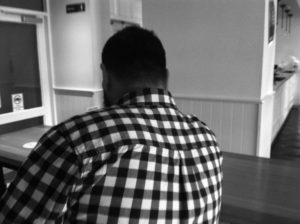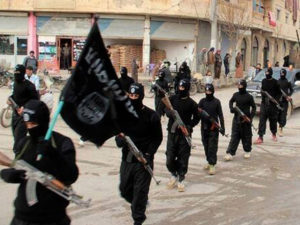EXCLUSIVE: Bombs, threats, executions – life under ISIS
A Melbourne refugee family recently resettled here from Syria have told of the horror, barbarism and fear that became everyday life in an area controlled by ISIS extremists.
Syrian refugee Bassam said witnessing first-hand the brutality of ISIS death squads immediately sowed doubt in his mind about the long-term future for his family in their homeland.
But a personal run-in with ISIS thugs in his hometown and the destruction by a bomb of his house – in the strife-torn and ISIS-controlled city of Raqqa – convinced him he must leave forever and get his family to safety.
 Bassam witnessed the horror of the Syrian conflict up close when ISIS established a ‘checkpoint’ only a few hundred metres from his home. Syrian soldiers and anyone who spoke against ISIS would be held there and often executed.
Bassam witnessed the horror of the Syrian conflict up close when ISIS established a ‘checkpoint’ only a few hundred metres from his home. Syrian soldiers and anyone who spoke against ISIS would be held there and often executed.
He told of one incident when, hearing something from his apartment one night, he went out onto the balcony to investigate.
“I was hiding as I looked and saw a ute bringing people to this checkpoint,” Bassam said.
“I realised they had two young soldiers, probably only about 18 years old, and they looked terrified.”
Bassam said a ‘sheikh’ was then called to come and decide what to do with the men.
“The sheikh simply ordered that the group cut the soldiers’ throats,” said Bassam, who requested iMPACT not publish his full name or a photograph of his face.
Bassam, who bought and sold cars in Raqqa, said his community lived in constant fear as ISIS had zero tolerance for anyone who spoke out against them.
A tall fence around a nearby roundabout, once a busy intersection with cafes and restaurants, now displays the heads of dead soldiers, he said.
“These people are brainwashed. They are just kids when they get involved in these groups,” Bassam said.
“They target the young, the poor, the uneducated.”
Bassam had his own run-in with the group when someone saw him smoking on the street one day.
“They grabbed me and locked me up for five hours because they said smoking is ‘against God’,” he said.
“They said if they saw me smoking again, they would cut off my fingers.”
Apart from the threat of ISIS, Bassam and his family faced other dangers. As civilians living in a war zone, they almost became ‘collateral damage’.
He considers himself and his family lucky to be alive after their house was blown up.
“The bomb threw me across the room,” Bassam said.
“My wife was in the kitchen, she was pregnant at the time.”
Bassam’s father returned home soon after to find the house completely destroyed. Together they eventually found all the family members alive under the rubble.
That night, Bassam took his family to Turkey.
The trip was a tense three-hour journey, with his wife heavily pregnant at the time.
“We drove as far as we could and then we had to walk a few kilometres to get across the border and we could hear guns being fired nearby,” Bassam said.
“At one point the Turkish troops were firing at us. I’m not sure how we survived but we made it to a safe place.”
 The family was eventually resettled in Australia in early 2016.
The family was eventually resettled in Australia in early 2016.
Now Bassam, his wife and three children, all under four years of age, along with Bassam’s parents are living in the Melbourne’s north-west and have started new lives.
However the unimaginable things Bassam’s family have witnessed have left indelible marks on them.
His four-year-old son is traumatised and his mother blind in one eye.
“My son was so scared, he just stopped speaking after the house explosion. He has been seeing a psychologist since we came to Australia,” Bassam said.
“But he is improving and his English is good. He is making friends at kindergarten.”
Bassam said the explosion in the house left his mother blind in one eye, amongst other health conditions that she continues to face in Australia.
Bassam used to study law in Raqqa and hopes to continue his studies one day. But for now he is focused on improving his English and his family’s health.
“All Syrians wish the same thing, for Syria to go back to normal,” Bassam said.
“Syria used to be a safe country, a beautiful country.
“Like New York, it was the place that never sleeps,” he said.
Carissa Gilham & Laurie Nowell
AMES Australia Staff Writers












